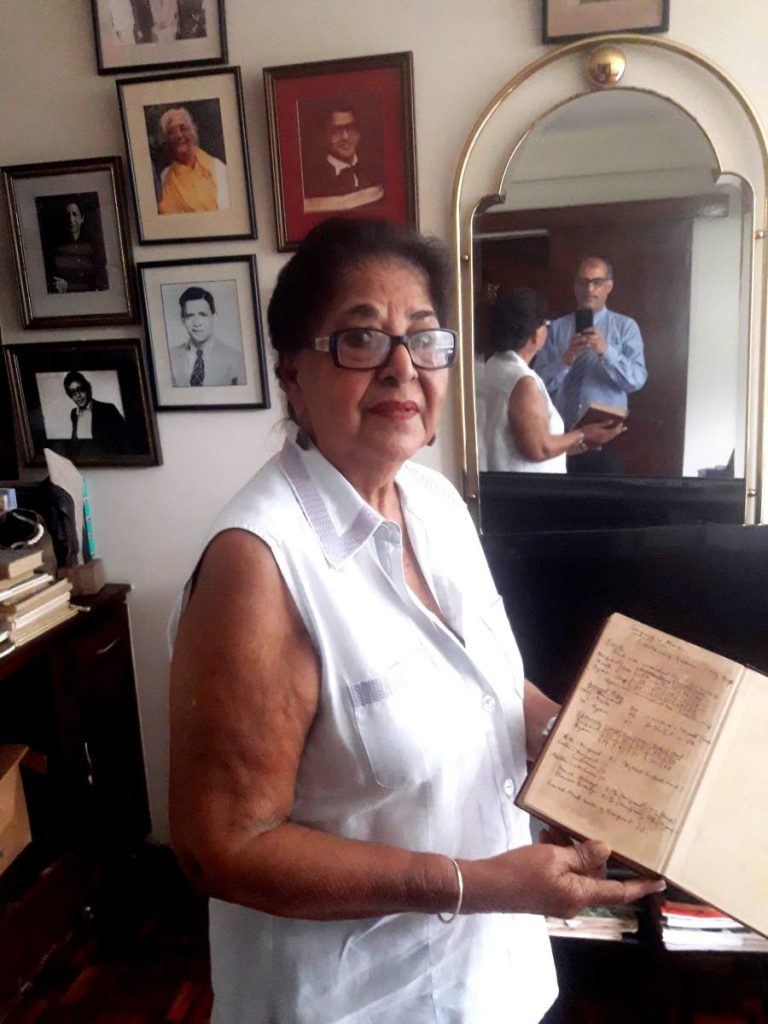FUNERAL BY INVITATION ONLY

NOBEL LAUREATE Sir Vidia Naipaul’s funeral is being kept a secret in London.
So it seems to his three sisters, one of whom lives in Trinidad, one in the United States and the youngest in Scotland.
In an interview yesterday, Savi Akal, 80, said at her home in Valsayn that the three surviving siblings — herself and her sisters Nalini Chapman, 66, and Mira Enalsingh, 82 — have not been told anything about arrangements for their brother’s since he died on Saturday.
Akal said it seems an area of darkness hangs over the funeral for the world-acclaimed author as far as his birth family is concerned. Naipaul never held a funeral for his first wife Pat, she said, so it may be that he did not request one.
Akal last visited Naipaul, 85, at his London flat in April, when the family celebrated her 80th birthday with him and his wife Lady Nadira Naipaul.
She told Newsday yesterday that the family heard through the grapevine that attendance at their brother’s funeral would be by invitation only. “It is the norm in England,” she added.
Since hearing of her brother’s death, she has been listening often to the BBC radio news from London for any word of his funeral. If she hears on the BBC that there will be a funeral for her brother, she would consider attending.
Bemoaning that Lady Naipaul, her sister-in-law of 20 years, has not communicated any such details with any of the sisters, Akal said, “After the news on Saturday we have not had a word from her. Nalini, in Scotland, has not been told anything since. Mira in the US, neither.
“We do not know if there is going to be a funeral. We do not know if our brother wanted a funeral.
“If there is going to be one, we will have to be invited, and no such invitation has been extended to us. We are a family of orientation. Today is Monday and up to the point of dying, we haven’t heard anything. It could be that she’s probably making arrangements.”
Nevertheless, she felt that their brother having died “more than 48 hours now, we should have been told if there is going to be a funeral...His wife knows where were are living. She should be telling us.”
Akal said she had sent Lady Naipaul an e-mail but had received no reply up to late yesterday.
Naipaul had been ailing for the past three months, Akal said, and: “We all knew what was going to happen.”
He had to be taken to a hospital emergency department a few times, she said. At home, she recalled, he sat up, but had to be fed.
In April she spoke to her brother at length, and though he hardly spoke, “He was still sharp; he knew everything about what was happening in the literary world.”
However, “We knew his body was giving up,” Akal said, recalling how she kept passing her hands over his hair.
She had asked Naipaul, who left the family in Trinidad at 18 for Oxford University on a national scholarship, how he would like to be remembered.
“He told me that his work must live on. That was his final wish.
“I passed my hands on his hair and I told him that I love him. And when I left, he asked Nadira when will I see her again.”
Naipaul visited Trinidad quite often. Akal, a retired college teacher, said it was just a couple years ago that he last visited, but privately.
She shared some memories of Naipaul while growing up in Port of Spain. He was a child who loved to walk, but he never did any household chores.
Vidia was the elder of the two boys in the family (Shiva, the younger, died suddenly at 40 in 1985).
“Vidia never even washed a plate, nor plant(ed) anything. He did nothing like housework when we were growing up. He read and read and studied his work.
By 14, she said, Vidia was obsessed with leaving Trinidad. “I remember even as a little boy, he never felt comfortable living here. He always kept saying he had to leave.”
Asked how the country should honour her brother, she said Naipaul, who won many international prizes for his work, would prefer nothing tangible, but for his books to be studied and further assessed.


Comments
"FUNERAL BY INVITATION ONLY"